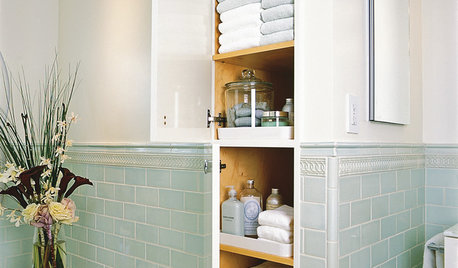Organic Fertilizer for Gritty Mix
PFCMCL
9 years ago
Related Stories

GARDENING GUIDESGet on a Composting Kick (Hello, Free Fertilizer!)
Quit shelling out for pricey substitutes that aren’t even as good. Here’s how to give your soil the best while lightening your trash load
Full Story
GARDENING GUIDESHow to Switch to an Organic Landscape Plan
Ditch the chemicals for a naturally beautiful lawn and garden, using living fertilizers and other nontoxic treatments
Full Story
GARDENING GUIDESHow to Keep Your Citrus Trees Well Fed and Healthy
Ripe for some citrus fertilizer know-how? This mini guide will help your lemon, orange and grapefruit trees flourish
Full Story
GARDENING GUIDESCommon Myths That May Be Hurting Your Garden
Discover the truth about fertilizer, soil, staking and more to keep your plants healthy and happy
Full Story
LAUNDRY ROOMSSoak Up Ideas From 3 Smart Laundry Rooms
We look at the designers’ secrets, ‘uh-oh’ moments and nitty-gritty details of 3 great laundry rooms uploaded to Houzz this week
Full Story
KITCHEN DESIGN8 Kitchen Organizing Ideas for Messy Cooks
Not the clean-as-you-go type? Not to worry. These strategies will help keep your kitchen looking tidy no matter what your cooking style is
Full Story
FALL GARDENING5 Ways to Put Fall Leaves to Work in Your Garden
Improve your soil and yard the organic way with a valuable garden booster that grows on trees
Full Story
GARDENING GUIDESThe Poop Scoop: Enrich Your Soil With Good Old Manure
Get over the ick factor already — this natural super-ingredient for soil has so many benefits, you'll wonder why you ever went chemical
Full Story
HOUSEKEEPINGGet It Done: Clean Out the Linen Closet
Organized bliss for your bedroom sheets and bathroom towels is just a few hours away
Full Story
FARM YOUR YARDHow to Grow Vegetables in Containers
Get glorious vegetables and fruits on your patio with a pro’s guidance — including his personal recipe for potting mix
Full StoryMore Discussions






nil13
oxboy555
Related Professionals
Benbrook Landscape Architects & Landscape Designers · Dallas Landscape Contractors · Federal Way Landscape Contractors · Galt Landscape Contractors · McLean Landscape Contractors · Northbridge Landscape Contractors · Ridgewood Landscape Contractors · Wheat Ridge Landscape Contractors · East Norriton Landscape Contractors · Rockledge Solar Energy Systems · Pedley Window Contractors · San Juan Capistrano Window Contractors · Washington Window Contractors · Cockeysville Fence Contractors · Laguna Beach Fence Contractorsjodik_gw
jodik_gw
drew51 SE MI Z5b/6a
greenman28 NorCal 7b/8a
Jay Part Shade (Zone 10B, S21, Los Angeles)
drew51 SE MI Z5b/6a